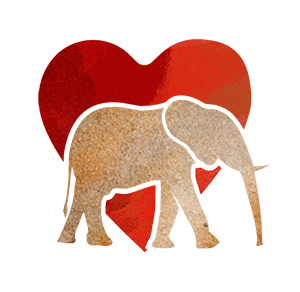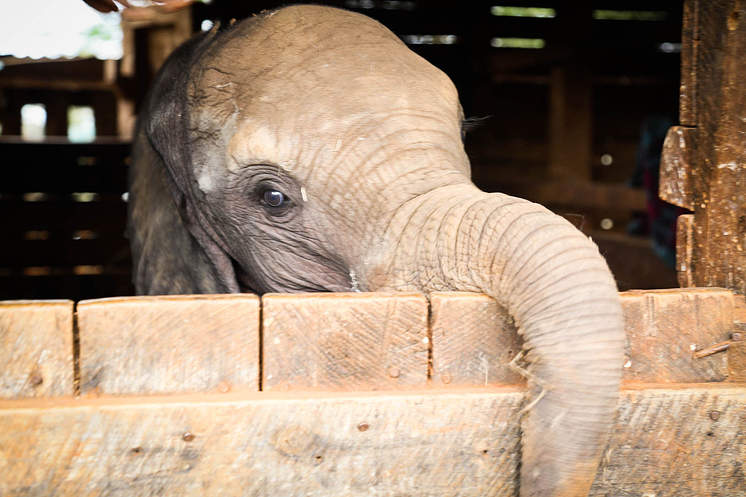In the early hours of 16th October, at the request of the Kenya Wildlife Service (KWS) our SWT/KWS Canine Unit headed to Tsavo West National Park to help track down two suspected poachers, who had been spotted the evening before. The team convened with KWS and Tsavo Trust rangers to coordinate a search, and it was then they received a disturbing report; not far from where they were gathered, a patrolling aircraft had just sighted a tiny elephant calf standing beside the body of his deceased mother.
Knowing that time is of the essence in cases like these, the team immediately changed tack and headed in the direction of the calf and the mother’s carcass. At first, they thought that the pilot’s GPS coordinates had to be wrong. They were leading the men up an impossibly steep lava hill, with huge chunks of lava rock and thick vegetation impeding every step. It seemed like a very improbable place for an elephant mother to bring her calf. Despite this, they trekked on.
When they reached the top of the hill, the team was met with a heart-breaking sight, that of a beautiful female elephant lying dead with her nine-month-old calf standing by her side. He cut a tragic figure, huddled next to his mother’s body in this harsh terrain. Given the dense bush and jagged lava, the helicopter couldn’t even attempt landing in the area, and it quickly became clear that the only option was to descend the hill on foot with the calf. Although he was small, the orphan had lots of adrenaline pumping through his veins and vigorously resisted all efforts to shepherd him down the hill.
After several stop-and-go attempts, a brave few were able to descend with the calf — half carrying, half walking his resisting little body — and guide him to the road. By this time, the temperature was soaring, so the team waited in the shade of an acacia tree and poured cool water behind the baby’s ears and over his back. The SWT helicopter soon arrived with Justus, a very experienced Keeper, to bring the baby to the Nursery. They landed, strapped in their passenger, and headed in the direction of Nairobi. With a successful rescue under their belts, the SWT/KWS Canine Unit resumed their original mission of searching for signs of the poachers who had been reported the previous day.
At the Nursery, meanwhile, the Keepers were ready to meet their new arrival. As soon as the helicopter’s rotors stopped spinning, they ferried the precious bundle to his stockade. They had to make a hasty retreat after helping him to his feet because, despite being little, he still had a lot of fight in him. Over the intervening weeks, he has settled in beautifully and is enjoying all the attention lavished on him by the Keepers and the rest of the Nursery herd. We named him Roho, which means “spirit” in Swahili — an apt name for this brave little boy.
We can’t fathom why Roho’s mother climbed to that inhospitable place. An autopsy was inconclusive, so this particular mystery may remain unsolved. Given the reason that our teams had assembled there in the first place, however, it’s very possible that she brought her baby there in a desperate bid to retreat from poachers. Although she lost her own life, her efforts to protect her baby were not in vain. We’re immensely proud of our team’s heroic efforts to rescue little Roho, and we’re pleased that we can offer him a new family, and a future.






















